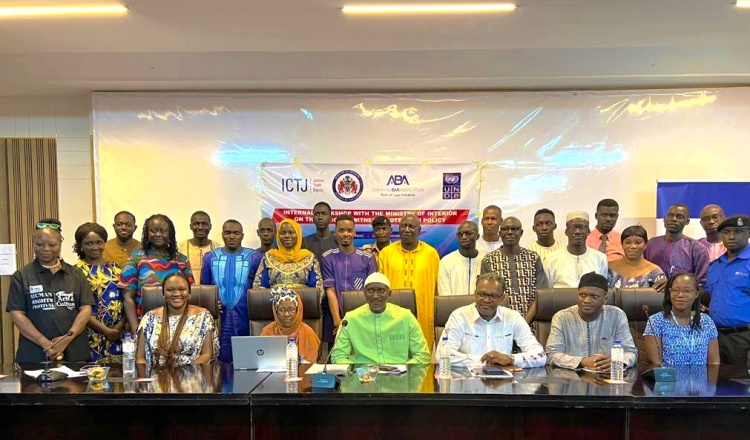Gambiaj.com – (BANJUL, The Gambia) – The Gambia’s Ministry of Interior (MOI), in collaboration with the International Center for Transitional Justice (ICTJ), the American Bar Association, and other key stakeholders, convened a workshop to advance the implementation of the National Victims and Witness Protection Policy. The event brought together officials, legal experts, and human rights advocates focused on enhancing justice and security for those affected by past crimes.
The National Victims and Witness Protection Policy is designed to foster accountability for historical injustices while safeguarding the rights and well-being of victims and witnesses. By providing robust legal and psychological support as well as physical protection, the policy aims to create a secure environment conducive to truth-telling and justice, ultimately preventing the recurrence of abuses.
In remarks delivered on behalf of the Minister of Interior, Abdoulie Sanyang, the Deputy Permanent Secretary (Technical), Ms. Mbayang Njie, highlighted the policy’s importance for ensuring access to justice. “This policy is a significant step in guaranteeing the safety of individuals who come forward with the truth, supporting their right to seek justice without fear. It underscores our commitment to upholding human rights,” she emphasized, noting that the policy provides comprehensive protections for both victims and witnesses who are critical to judicial proceedings.
Didier Gbery, the head of ICTJ’s program in The Gambia, underscored the essential role of victim and witness protection in building a fair and transparent judicial system. “Safeguarding victims and witnesses is central to the fight against impunity. It upholds their physical, moral, and intellectual integrity and strengthens the reliability of our justice system,” Gbery stated in his welcoming address.
The workshop also featured remarks from Dr. Saikou Kawsu Gassama, Executive Secretary of the National Human Rights Commission (NHRC), who noted that the policy will empower law enforcement agencies to better evaluate risks and implement protection measures for those at risk. Dr. Gassama emphasized the proactive role that police and law enforcement play in identifying and mitigating threats against individuals participating in justice processes.
Representing the Promoting Rights and Justice Activity in The Gambia, Fatou Bintou Sallah highlighted the critical timing of the policy’s implementation, calling for close coordination among the judiciary, law enforcement, victims, and alleged perpetrators. Sallah pointed out that an integrated approach would be key to the policy’s success in addressing sensitive legal challenges effectively.
The consultation workshop represents a critical step in operationalizing The Gambia’s commitment to supporting victims and witnesses as the country continues to address the legacy of past crimes. The Ministry of Interior and its partners remain dedicated to building a safe, transparent judicial system that respects the dignity and rights of all involved.










